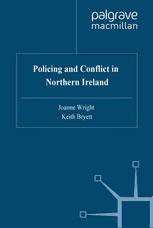
Policing and Conflict in Northern Ireland PDF
Preview Policing and Conflict in Northern Ireland
Policing and Conflict in Northern Ireland Also by Joanne Wright TERRORIST PROPAGANDA Also by Keith Bryett AN INTRODUCTION TO POLICING Volume 1: Criminal Justice in Australia (with Emma Craswell, Arch Harrison and John Shaw) AN INTRODUCTION TO POLICING Volume 2: The Role and Function of Police in Australia (with Arch Harrison and John Shaw) AN INTRODUCTION TO POLICING Volume 3: Policing in the Community (with Arch Harrison) AN INTRODUCTION TO POLICING Volume 4: Procedures in Policy (with Arch Harrison) CONTEMPORARY POLICING: Un-peeling Tradition (with Colleen Lewis) Policing and Conflict in Northern Ireland Joanne Wright Director of European Studies Royal Holloway University of London and Keith Bryett Private Consultant on Policing and Criminal Justice First published in Great Britain 2000 by MACMILLAN PRESS LTD Houndmills, Basingstoke, Hampshire RG21 6XS and London Companies and representatives throughout the world A catalogue record for this book is available from the British Library. ISBN 978-1-349-41014-9 ISBN 978-0-230-51480-5 (eBook) DOl 10.1057/9780230514805 First published in the United States of America 2000 by ST. MARTIN'S PRESS, LLC, Scholarly and Reference Division, 175 Fifth Avenue, New York, N.Y. 10010 Library of Congress Cataloging-in-Publication Data Wright, Joanne, 1960-- Policing and conflict in Northern Ireland I Joanne Wright and Keith Bryett. p. em. Includes bibliographical references and index. 1. Royal Ulster Constabulary. 2. Police-Northern Ireland. I. Bryett, Keith. II. Title. HV8197.5.A3 W75 2000 363.2'09416-dc21 00-022340 © Joanne Wright and Keith Bryett 2000 Softcover reprint of the hardcover 1st edition 2000 978-0-333-74324-9 All rights reserved. No reproduction, copy or transmission of this publication may be made without written permission. No paragraph of this publication may be reproduced, copied or transmitted save with written permission or in accordance with the provisions of the Copyright, Designs and Patents Act 1988, or under the terms of any licence permitting limited copying issued by the Copyright Licensing Agency, 90 Tottenham Court Road, London WlP OLP. Any person who does any unauthorised act in relation to this publication may be liable to criminal prosecution and civil claims for damages. The authors have asserted their rights to be identified as the authors of this work in accordance with the Copyright, Designs and Patents Act 1988. This book is printed on paper suitable for recycling and made from fully managed and sustained forest sources. 10 9 8 7 6 5 4 3 2 1 09 08 07 06 05 04 03 02 01 00 For Sean and Ellen Contents Preface ix List of Abbreviations xiii Introduction XV 1 The Importance of Policing 1 2 Some Options 18 3 Setting the Parameters - Public and Political Opinion on Police Reform 41 4 Best Practice and Reform 73 5 Police Reform in Northern Ireland 93 6 Conclusions 114 Notes 124 References 133 Index 145 Vll Preface Since its creation in 1921-2, Northern Ireland has been a deeply troubled society. Its two major communities have not been able to reconcile their political and cultural differences with the result that violence and oppression have been frequent and costly. Since 1969, over 3000 people have lost their lives and tens of thousands have been injured. Generations of children have never known a society at peace or enjoyed the economic, social and cultural stimulation of pluralism and tolerance. The rest of the world tends to know Northern Ireland only through its horrors - of Bloody Sunday, of La Mon, of Greysteel, of Enniskillen, of three wee boys being burnt to death by petrol bombers, of Omagh... However, there is no doubt that the politics of Northern Ire- land entered a new era with the signing of the Good Friday Agreement on 10 April 1998. The Agreement described itself as 'a truly historic opportunity' and it was signed by representa- tives of all Northern Ireland's political groupings, including those with close links to the women and men of violence. The signa- tories to the Agreement pledged their 'total and absolute commitment to exclusively democratic and peaceful means of resolving differences on political issues, and [their] opposition to any use or threat of force by others for any political purpose, whether in regard to this Agreement or otherwise'.1 The Agreement was also approved by all the peoples of Ireland in subsequent referenda. In Northern Ireland 71 per cent of those who voted supported the Agreement and in the Republic of Ireland, 95 per cent of those who voted approved. The Agreement aims to restore self-government to Northern Ireland and to build trust, cooperation and reconciliation be- tween the two major communities. These aims are to be achieved through an ambitious set of linked proposals. The major recom- mendations included provision for an elected Northern Ireland Assembly which would assume executive powers on a power- sharing basis, moves towards the decommissioning of terrorist weapons and the release of terrorist prisoners. Also included in
